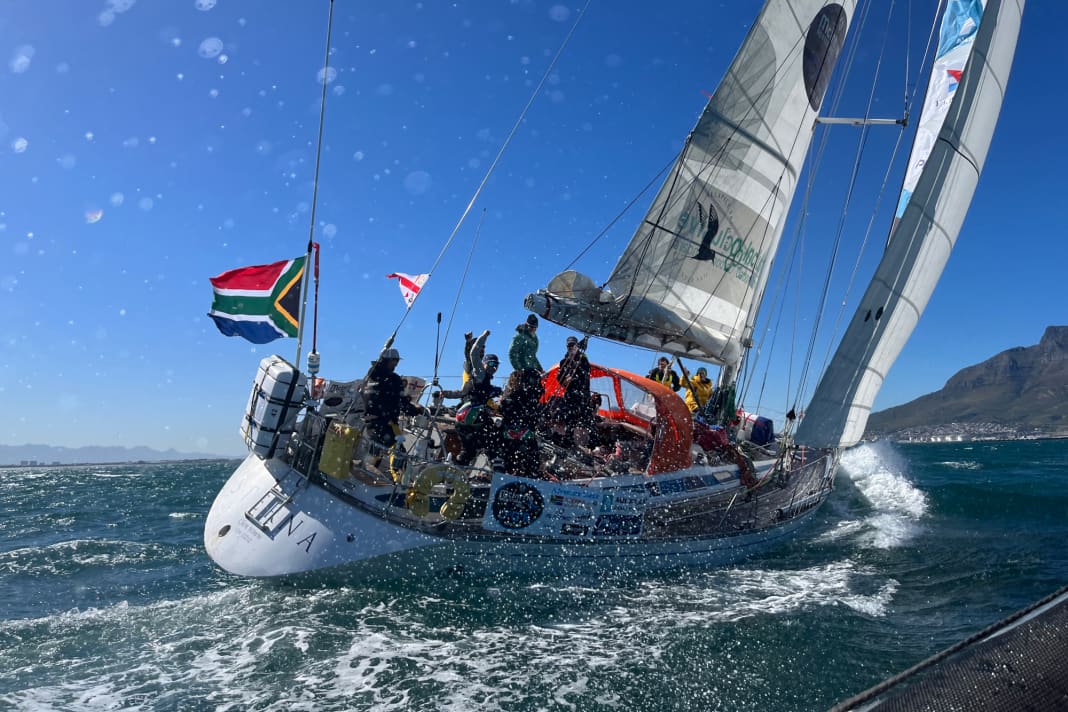





Nevertheless, the atmosphere on the "Sterna" is good, reports Ebru Yaral from Hamburg, who is part of the crew and wants to complete the entire circumnavigation. Why her team is travelling to an already delayed start from Cape Town had to turn around again and is now starting the second leg to New Zealand a good 3,500 nautical miles behind the leader of the circumnavigator fleet, she reports shortly before setting off from Mossel Bay in South Africa:
"We started two days after the regular start in Cape Town. Everything went brilliantly. The weather was good and we had nice wind, sometimes even too little. We were incredibly fast by our standards, as the underwater hull was freshly painted with antifouling in Cape Town and the rig was also readjusted.
All in all, we were in a great mood and the crew quickly got back into rhythm. We were already in our race routine on the second day."
On Friday, however, the compass lighting went out overnight. We thought it might be the bulb or a loose connection in the cable. In daylight we investigated the problem and realised that the cable was heavily corroded at one point and that we had a lot of water in the lazarette. We quickly realised that it was coming from the rudder stock or from the connection between the stock and the boat. We also noticed slight play there.
Our goal from the start was to sail safely and completely around the world. So it was no surprise that our skipper Rufus Brand decided to sail back to South Africa to have the problem checked and repaired. On the evening of 11 November, we turned around and informed the race management.
Of course we were all frustrated. Nobody really wanted to turn back, but preferred to sail on.
But we also agreed that the safety and health of the boat and crew were of paramount importance and that we didn't want to risk losing the rudder somewhere in the southern Indian Ocean."
On the way back to Cape Town we encountered 40 knots of wind - almost as if the weather gods were telling us not to sail back. We reached Mossel Bay on Monday evening. The South African harbour was the only one where we could be lifted out of the water the next day, even if that meant having to tie up to an immensely high quay wall in the industrial and fishing harbour and having a night watch for the lines because of the tides.
We were only able to clear in and leave the boat the next day. The boat came ashore in the afternoon. An adventurous operation! But it was worth it: professionals were able to do the work on the rudder stock and attach the shaft to the boat.
Unfortunately, we couldn't clear out straight away and sail on, but had to wait until Tuesday. At least we were able to explore the country a little: unbelievably great!"
What happens next? With this delay, we won't make it to Auckland before Christmas and probably not before New Year's Eve either, but we are looking forward to Christmas at sea with international traditions. However, the race organisers have planned a fairly long stay for the crews in New Zealand, so we could still manage to start the third leg with everyone else. So everything is still open."
Follow the Ocean Globe Race in the live tracker:
At this point, you will find external content that complements the article. You can display and hide it with a click.
About the Ocean Globe Race
The Retro race around the world is taking place this year to mark the 50th anniversary of the 1973 Whitbread Round the World Race. On 10 September 2023, 14 crews set off from Southampton on the 27,000-mile voyage, which is divided into four stages and leads through the Southern Ocean and around the three large capes.
The stopovers are in Cape Town in South Africa, Auckland in New Zealand and Punta del Este in Uruguay, before the circumnavigation ends back in the UK in April 2024.

